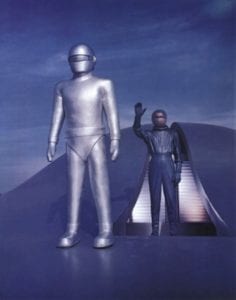In the 1951 classic science fiction movie, The Day the Earth Stood Still, space traveler Klaatu, played by British actor Michael Rennie, lands his spaceship in Washington, DC. His reception, however, is anything but warm.
He is hunted down, shot, and imprisoned.
But moments before he is finally taken, he warns the leading lady, Helen Benson, about his avenging robot – eight-foot-tall Gort. If anything happens to him, Klaatu explains, Gort will wreak revenge on the city. Therefore, she must intercept him and repeat this command: “Klaatu Barada Nikto!”
Helen can’t believe her ears. She argues, “But he’s a robot. Without you, what could he do?” Klaatu gravely responds, “There’s no limit to what he could do. He could destroy the earth.”
I thought of Klaatu’s solemn warning–“There’s no limit to what he could do”–while reading the gospel of account of Jesus healing the paralytic in Matthew 9:1–8. It’s the story of four men  carrying a paralyzed man to Jesus that He might heal him. They cannot reach Jesus because a crowd fills and surrounds the house where He is teaching. So, the four men break an opening in the roof above Jesus and lower the man through the roof, right in front of Him. When Jesus sees the faith of the men, He says to the paralytic, “Be of good cheer, your sins are forgiven.” Immediately, the religious leaders among the crowd condemn Jesus in their thoughts: “This man is blaspheming. No one can forgive sins, but God alone” (Matthew 9:1–3; Mark 2:1–6).
carrying a paralyzed man to Jesus that He might heal him. They cannot reach Jesus because a crowd fills and surrounds the house where He is teaching. So, the four men break an opening in the roof above Jesus and lower the man through the roof, right in front of Him. When Jesus sees the faith of the men, He says to the paralytic, “Be of good cheer, your sins are forgiven.” Immediately, the religious leaders among the crowd condemn Jesus in their thoughts: “This man is blaspheming. No one can forgive sins, but God alone” (Matthew 9:1–3; Mark 2:1–6).
Knowing their thoughts, Jesus immediately asks them, “Why are you reasoning this way in your hearts? Which is easier to say to the paralytic, ‘Your sins are forgiven’ or to say, ‘Rise, pick up your pallet and walk?’” Jesus’ point is this: It’s not for humans to say. Both commands are equally impossible for mere mortals to say with effect. But since Jesus’ word has never failed to heal the sick (Matthew 8:5–16), cleanse the leper (Matthew 8:1–4), cast out demons (Matthew 8:28–32), raise the dead (Mark 5:35–43), and calm the tempest (Matthew 8:23–27), we should conclude, “There’s no limit to what the command of Christ can do!”
Furthermore, the power and authority of Christ’s command is vividly expressed in the Sermon on the Mount. As He delivers the Sermon on the Mount Christ repeats the formula, “You have heard it said … but I say to you” a total of fourteen times (Matthew 5:18, 20, 22, 26, 28, 32, 34, 39, 44; 6:2, 5, 16, 25, 29). In contrast to the rabbis of Jesus’ day, who typically cited numerous supporting authorities to undergird their statements. Jesus’ words required no supporting authorities—were authoritative in themselves. Indeed, Jesus went so far as to claim that everyone who heard His words and obeyed them would be as a man who built his house upon the rock.
supporting authorities—were authoritative in themselves. Indeed, Jesus went so far as to claim that everyone who heard His words and obeyed them would be as a man who built his house upon the rock.
Conversely, He stated that whoever failed to heed them would be as a man who built his house upon sand and would be swept away (Matthew 7:24–27). As a result, His audience was mesmerized at His words, noting that Jesus “taught as one having authority and not as their scribes taught” (Matthew 7:28-29).
Therefore, by the time Jesus said to the paralytic, “Be of good cheer, your sins are forgiven,” there should be no doubt in our minds of the power and authority of Christ’s word. “There is no limit to what His word can do. Christ’s word could heal the sick, cleanse the lepers, drive out demons, raise the dead, create the universe (John 1:1–3; Colossians 1:16; Hebrews 1:1–2) and—forgive every sin (Matthew 9:6–8).”
Prayer:
Dear Lord Jesus, to You I cling for salvation and forgiveness. To You I cling for healing and strength. Save me, O Lord, and empower me to serve You and please You in all I do. Amen.








